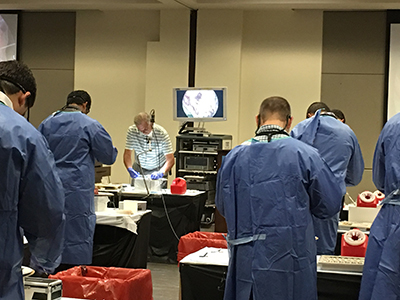Educational Activities
Didactic Teaching
Cardiac
- Weekly presentation by Faculty and Residents/Fellows followed by Q&A.
- Weekly Resident/Fellow case presentation and indications conference.
Thoracic
- Weekly presentation by residents about the interpretation of imaging, the workup, and management of various thoracic diseases.
- Weekly Resident/Fellow case presentation and indications conference.
- Weekly multiple disciplinary tumor board (Radiation Oncology, Interventional Pulmonology, Pathology, Thoracic Surgery).
Simulation Lab
Cardiothoracic Surgery is developing a national approach to utilize simulation in an organized fashion for resident education. Through the Grateful Donors Program at the University of Rochester Medical Center we have purchased a computerized high-fidelity Ramphal pig heart simulator and developed a course to enhance skills for Cardiothoracic and General Surgery residents. Together with General Surgery we have developed a robust simulation program to enhance laparoscopic, thoracoscopic, robotic, open, and critical care skills. These skill sets are essential for the everyday performance of Cardiothoracic Surgery and the care of post-op patients. Simulation represents the most important change in traditional curricula allowing residents to develop and master new skills outside the pressured environment of the OR or ICU.
See photos and videos of our Simulation Lab
 Monthly Lab Schedule
Monthly Lab Schedule
- Coronary Anastomosis
- Endoscopy/Bronchoscopy, EGD, EBUS, ect.
- TSDA Boot Camp Prep
- Tracheal Resections (Sleeve)
- VATS
- Aortic Root Replacement
- Minimally Invasive Cardiac Surgery
- Combined Cadaver Lab with Cardiac, Thoracic, & Vascular Surgery Faculty & Residents/Fellows
- Mitral Valve Repair/Replacement
- Aortic Arch Replacement
- Airway Emergencies
- Advanced Complete-Case Simulation
Resources
- Miner Library, the University of Rochester medical library, provides robust electronic resources for the medical community. Reference librarians offer a journal search service to assist residents in research projects.
- Laparoscopic instruments, vessel anastomosis kits, and surgical instruments are available for use at any time in addition to the skills labs to master technical skills necessary to becoming a successful Cardiothoracic Surgeon.
- TSDA 88 week curriculum is used as an organizational tool for weekly conferences, to initiate discussions and questioning about CT topics.
- www.ctsnet.org, www.tsranet.org, and TSRA published, Primer and Clinical Scenarios are valuable resources utilized frequently.
Journal Club
Journal club occurs once per month. Residents present an article from a major journal and discuss its merits and potential implications on the practice and art of Cardiothoracic Surgery. Journal clubs are also held in conjunction with the Anesthesia and Vascular Surgery.
Grand Rounds
Thursday morning Grand Rounds are held with the Department of Surgery. Various topics are discussed by the faculty and guest lecturers throughout the year. Departmental mortality and morbidity conference is held once per month.